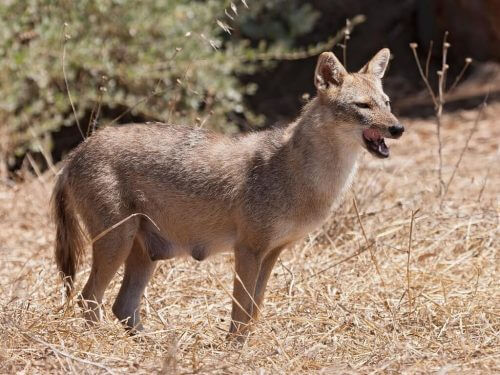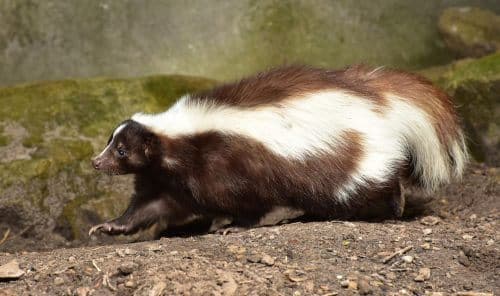The outbreak of rabies in the north of Israel in extraordinary proportions is causing fear among the population. Why is this happening now and is it related to climate change?

By Maya Falah, Angle, Science and Environment News Agency
In recent months, we have been hearing about more and more unpleasant encounters of northern residents with wild animals that are suspected of being infected with rabies. In fact, last year the record of recent years was broken in mammals that were definitely found to have rabies in Israel, and their number already stands at Close to 70 cases towards the end of December 2017. An outbreak of a similar magnitude, albeit on a smaller scale, was recorded in 2010, when a total of 54 cases were counted.
This outbreak comes precisely after a decrease in the spread of the disease in Israel has been observed in recent years, this after the veterinary services at the Ministry of Agriculture, in cooperation with the Nature and Parks Authority, began in the late XNUMXs. Distribute vaccines to prevent the disease in the wild animal population. The vaccines are dispersed from the air twice a year - in the spring and in the fall - in open areas, mainly in areas that are considered to be prone to disease outbreaks. They are placed inside an edible bait, which causes them to develop antibodies to the disease.
These lures have apparently helped in recent years to reduce the percentage of wild animals infected with the disease, but last year, especially starting last fall, it seems that they are no longer enough to deal with the emerging disease: dozens of animals were found to be infected with rabies, and more and more residents of the valleys in the north are reporting fear Walk outside after dark, walk the dog or let the children walk around unsupervised. The many encounters with sick animals also included several cases of attacks and bites - among them a four-year-old girl from Beit Shean, whoBitten by a jackal infected with rabies.
The jackals bring the rabies
Rabies is a dangerous disease that affects the nervous system and is transmitted mainly by mammals of the canine family, but it is contagious for most mammals, and every year not only pets are found infected with the disease, but also cows and sheep.
So what causes this abnormal outbreak? The Ministry of Agriculture claims that one of the reasons is Migration of jackals (some of which are infected with the disease) from the territory of Jordan in the Bekaa region to the territories of Israel. Although there is cooperation between Israel and Jordan in the distribution of vaccines, it is probably not enough to completely prevent the spread of the disease in Jordanian territories, certainly when there is a spillover of these animals into Jordan from the war-torn Syrian territories, where the sanitation services are not functioning.
Culture The jackal population is a problem facing the Nature and Parks Authority. but According to them, the solution is not so simple: Fencing the open areas, as the frightened residents of the north are calling to do, may damage vital ecological corridors. According to them, "the existence of a natural system is based on the ability of wild animals to migrate from area to area, and an area undisturbed by obstacles is the essence of a natural, normal and healthy ecosystem." Proactive thinning of the jackal population is also not a successful long-term solution, as jackals compensate for this the following year with increased reproduction.
Vaccines do not withstand heat
Another possible reason for the outbreak of the disease is actually related to climate change and its effect on our region. In recent years, summer has been late to leave, and in 2017 the temperatures continued to be hotter than the seasonal average in the months of October and November as well. The rabies vaccines, according to the Ministry of Agriculture, do not survive optimally in hot temperatures, so they are not distributed at all in the summer months - usually from May to October. Due to the high temperatures that continued deep into the fall, last year the vaccinations were distributed only at the beginning of November, thus creating a situation where the wild animal cubs born last spring did not get to eat the baits in time and get vaccinated.
"Until now, we have worked with a model that worked in terms of the distribution times of the vaccines, and we have not encountered this problem," says Dr. Ronnie King, the Nature and Parks Authority veterinarian who is responsible on their behalf for the distribution of the vaccines. "I admit that this problem of the young individuals was not before our eyes. This is the first time we come across such a story. Last fall - or when outbreaks started in recent years - they were curbed. Since until this year there had been no distress, we did not take it into account, and when we wanted to start the scattering this year we decided to wait until the weather was suitable - so as not to find ourselves scattering the lures in the swarms that sometimes accompany us at the end of the summer, and this year in particular there were many that lasted until late." .
This theory is also supported by data Ministry of Agriculture, which monitors the animals found to have the disease: "The findings indicate that the disease broke out mainly among the population of young jackals born last spring, after the distribution of the baits last year. In contrast, hundreds of adult jackals sampled in the outbreak area and vaccinated last year are completely healthy and have not been infected with the virus."
"The young jackals born in the spring only came out of their dens after the spring vaccinations were distributed, so they didn't have time to eat the baits," explains King. "But by the time autumn came, they had already come out of their burrows, and had time to be exposed to the disease before they ate the bait that was going to be spread at the end of autumn."
Vaccinations on a night flight

Studies from abroad have previously linked climate change to the spread of rabies and its outbreak in wild animals located near residential areas. In 2012, following an unusual attack of rabies in certain areas of the US (Texas, for example), researchers found that a factor that greatly influenced the outbreak and spread of the disease was in a severe drought that prevailed in these areas and hotter than usual weather. The heat and lack of water, according to the researchers, caused wild animals affected by rabies, in this case mainly skunks, to approach populated areas in search of water and food - where they came into contact with pets, stray cats and also humans and caused an extended spread of the disease.
Research published Following this last year, he stated that climate change will gradually increase the incidence of the disease among skunks in the US, which will of course increase the risk of the disease spreading to other animals and also to humans. Further research In recent years, there has also been a connection between climate change and the spread of rabies among foxes in Alaska. These data are consistent with other studies that show that global climate change Creates a trend of increased distribution of diseases.
According to the forecasts, the lengthening of the hot period in Israel is expected to become a permanent pattern. Therefore, the Ministry of Agriculture may have to think of another solution for vaccinating the wild animal population, one that will also be suitable for the hot season and will not leave them unanswered for many months. "We are now looking at all kinds of options, including spreading the vaccine at night," says King. "This will require us to prepare differently - our current aircraft cannot fly at night, they are not adapted to it. No matter how you look at it, it turns out that the most significant time to spread the vaccines is during the warm period - that's when the puppies come out of their burrows. We would be happy to start distributing earlier, and now we understand more how significant it is. We will have to puzzle over how to deal with it."
The solution in our hands?
The fact that the disease spread this time mainly among jackals (which are a protected animal in Israel) demonstrates another problem - the increased breeding and spread of the jackal population in Israel in recent years. These are not satisfied with finding food in the open areas and nature reserves, but rely more and more on being close to man, who leaves quite a bit of food around for them: from open garbage cans and bare dumps, to the carcasses of poultry, fish, sheep and cattle that are sometimes thrown at the edges of settlements or agricultural areas.
"The vaccine cannot solve the problem completely," states King. "It used to be thought that thinning the population could solve this, but reducing the population through active thinning has a minimal effect - it doesn't take long for the population to compensate for this, if the environmental conditions are not changed. That's why it's important to simultaneously invest in improving sanitation."
Indeed, the Nature and Parks Authority emphasizes that the main solution - at the same time as the effective distribution of the vaccines - should be an improvement and strict sanitation near settlements. Operations such as fencing garbage and compost sites, fencing chicken coops, fish ponds, barns and apartments; feeding pets that stay outside during the day, not at night - during the jackals' activity hours; Avoiding or reducing the feeding of street cats whose food that is given to them and not eaten also attracts wild animals; And making sure to dispose of leftover food in closed bins when going on a picnic - these steps will help to reduce the jackals' food supply from sources that are not natural for them and will prevent their arrival from the open areas to the proximity of humans.
At the same time, it is of course important to vaccinate the pets and not allow them to roam outside without a leash. In addition, it is very important to be careful to stay away from any wild or unfamiliar animal that shows signs of suspicious behavior (a wild animal that does not show fear of humans, or a domesticated animal that shows unusual aggression are examples of such a case), and to report immediately to the Nature and Parks Authority hotline at *3639.
